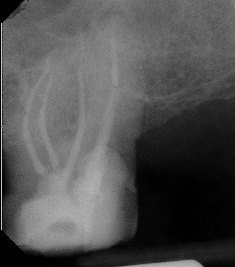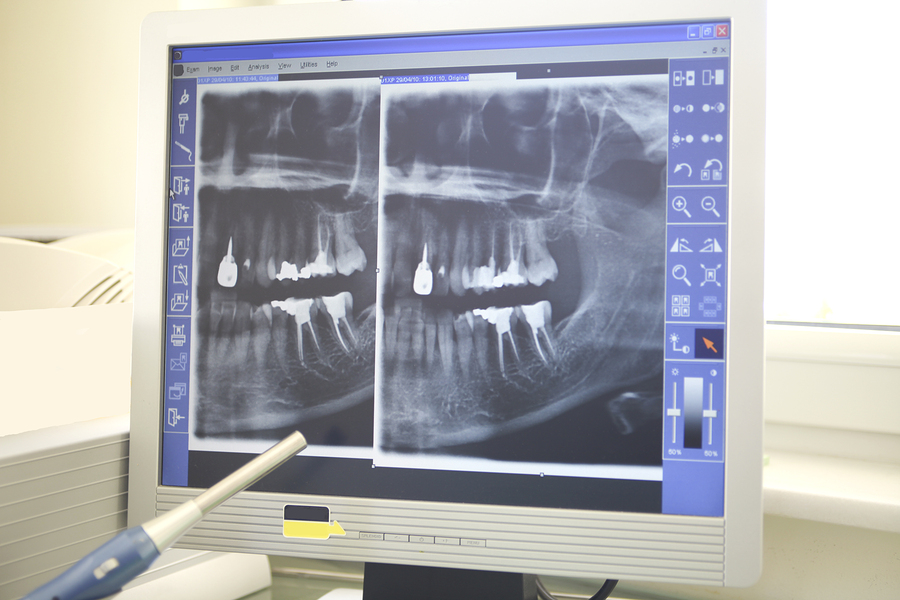
by Dr. Jacqueline S. Allen | Sep 4, 2014 | Endodontics, General Information, Patients, Root Canal
 When teeth in your mouth start to hurt and cause discomfort (and it happens to just about everyone), you may become faced with a decision to either 1) save your tooth with a root canal and a crown or 2) extract your tooth and do nothing else or 3) extract your tooth and have an implant placed. Let’s look in depth at all of these options.
When teeth in your mouth start to hurt and cause discomfort (and it happens to just about everyone), you may become faced with a decision to either 1) save your tooth with a root canal and a crown or 2) extract your tooth and do nothing else or 3) extract your tooth and have an implant placed. Let’s look in depth at all of these options.
1) Save Your Tooth – This is our mission at Phoenix Endodontic Group. We believe strongly that a person is much better off with their natural tooth in their mouth than placing a dental implant. Of course there are many factors to consider when making this decision and we feel the patient should always be a part of the decision making process before treatment is rendered. Phoenix Endodontic Group has invested in the latest endodontic technologies which help to make informed decisions about necessary dental treatment.
2) Extract Your Tooth – Sometimes a patient will want to just have the tooth extracted without any further restoration or treatment. This option works for some patients where there still are opposing teeth and chewing and biting will not be compromised by the extraction. Of the three options mentioned, this would of course be the least expensive because no further treatment would be needed and the source of the infection is immediately removed.
3) Have a Dental Implant Placed – Over the last 10 years, dental implants have exploded in popularity as a viable treatment option for patients who have experienced tooth pain and prior endodontic treatment. Phoenix Endodontic Group feels that dental implants have a place in the treatment spectrum, however we have seen many cases where given a little more time the tooth could have been saved with a root canal. We hate to see teeth extracted unnecessarily that could have been saved. Conversely when a tooth is hopelessly cracked or fractured it becomes time for a dental implant.
Here are some of the factors to consider with all three options: which tooth is it?, age of the patient, has the tooth had prior endodontic treatment, how much is the patient willing to invest to save the tooth. In most cases and root canal and final restoration are going to cost considerably less than the cost of a dental implant and restoration.
While no dentist can know for sure just how long a root canal or a dental implant will last (yes, dental implants do in fact fail over time), Phoenix Endodontic Group informs and listens to our patients to determine the right treatment choice for their specific situation. If you are in Phoenix, and need an endodontist “give us a call today” (602) 748-4190.

by Dr. Jacqueline S. Allen | Aug 4, 2014 | Blog, Endodontics, Endodontist, Root Canal
 Avoidance is a problem that often leads patients to postpone visiting their Phoenix Endodontist. Many have waited too long for their root canal, and are now in major pain. Dr. Jacqueline S. Allen of Phoenix Endodontic Group explains why you should never wait to have a root canal done.
Avoidance is a problem that often leads patients to postpone visiting their Phoenix Endodontist. Many have waited too long for their root canal, and are now in major pain. Dr. Jacqueline S. Allen of Phoenix Endodontic Group explains why you should never wait to have a root canal done.
When your dentist has told you that you need a root canal, you may have many emotions and may not take action immediately. Dr. Allen observes a few common reasons people put off their root canal: The three biggest fears of dental treatment are #1- Time (this will take too long), #2 – Pain (I hate going to the dentist, it always makes me hurt), and #3 – Money (patients don’t want to spend their hard earned money on an emergency dental procedure). While all of these reactions are reasonable, delaying the procedure will make things worse.
Your Phoenix Endodontist frequently has a bigger job ahead if you’ve waited to have a root canal. More extensive work may be required, or you may lose the chance to save the tooth altogether. The biggest risk is that a patient can develop an infection that becomes difficult to control. Additionally, waiting too long puts the patient at risk for having to have the tooth extracted. Waiting too long could cause the tooth to be condemned. A tooth with a damaged nerve or deep infection will not get better on its own.
Having a root canal done immediately after being told you need one provides several advantages. When the problem is caught early, it may be resolved more quickly and successfully. You’ll suffer less pain since you’ve dealt with it quickly. You are less likely to need the tooth pulled, which would result in the added expense of bone grafts and tooth implants down the road. You’ll prevent other medical issues that can occur as a result of the infection present in the tooth.
If you are told that you need a root canal, act quickly. Call Dr. Allen, your Phoenix Endodontist, to bring your smile back to life!

by Dr. Jacqueline S. Allen | Jul 28, 2014 | Blog, Endodontics, Root Canal
 Let’s face it, a root canal has been and always will be a much-dreaded procedure. Though the days of root canals being a painful process are long gone, chances are that a person still wishes to avoid the procedure. Dr. Jacqueline S. Allen of Phoenix Endodontic Group performs this effective treatment on a regular basis, and has the following to offer when patients ask how to prevent needing a root canal.
Let’s face it, a root canal has been and always will be a much-dreaded procedure. Though the days of root canals being a painful process are long gone, chances are that a person still wishes to avoid the procedure. Dr. Jacqueline S. Allen of Phoenix Endodontic Group performs this effective treatment on a regular basis, and has the following to offer when patients ask how to prevent needing a root canal.
Good dental hygiene and care is the best line of defense when it comes to root canals. It is always suggested that patients brush and floss daily and visit their dentist for regular check-ups both for optimal oral hygiene, and to catch any potential tooth problem in its early stage, Dr. Allen states. Detecting an issue early on can result in a much better chance of saving the tooth. While routine brushing and flossing is a great start, there is no one specific tip that can prevent the need for a patient to have a root canal. The nerves in teeth “go bad” and “die” for different reasons, sometimes with pain and other symptoms and other times with no symptoms at all, says Dr. Allen.
If your general dentist has detected a problem, you may wonder if there is an alternative to a root canal. In lieu of a root canal to treat tooth pain and infection, a patient can elect to have their tooth extracted, place a bone graft and then a dental implant (which then has to be restored), Dr. Allen advises. “If you took a poll, most patients would opt to keep their natural teeth as long as possible”, she continues.
Today’s root canals are very different from stories you’ve heard in the past. Advances in technology and treatment methods over the years mean less stress and pain. Most patients report that a root canal is no more uncomfortable than a filling, and recovery time is minimal.
For the best chance of success with your root canal, look to a skillful Endodontist like Dr. Allen at Phoenix Endodontic Group. In her expert hands, you will be out of pain and smiling again in no time!

by Dr. Jacqueline S. Allen | Jun 9, 2014 | Blog, Endodontics, Endodontist, Featured, Root Canal
 Chances are that most adults know of root canal treatment, but may not know what it involves. Root canal therapy is an extremely effective way to repair cracked or decaying teeth and prevent tooth loss. Dr. Jacqueline S. Allen of Phoenix Endodontic Group explains how this procedure can help you restore a bad tooth and why you shouldn’t be fearful of a root canal.
Chances are that most adults know of root canal treatment, but may not know what it involves. Root canal therapy is an extremely effective way to repair cracked or decaying teeth and prevent tooth loss. Dr. Jacqueline S. Allen of Phoenix Endodontic Group explains how this procedure can help you restore a bad tooth and why you shouldn’t be fearful of a root canal.
Gone are the days when root canal treatment was a major ordeal that left a patient in pain. With today’s methods and technology, many patients report minimal discomfort and compare it to having a filling done.
During the procedure, the infected pulp of the tooth is removed, the inside cleaned thoroughly, and the tooth refilled. This process restores the structure of the tooth. Any discomfort from the repair is mild and can be easily managed by using over the counter pain medication. As well, the materials used in the procedure have changed over the years. At one point in time, the material used to fill the roots was silver. Now it is gutta percha with antibacterial sealer, says Dr. Allen.
With time and experience, Endodontists have developed best practices to minimize complications, especially for patients who have severe symptoms or an unusual anatomy. We now use a rubber dam screen for all root canal procedures. This is to isolate the tooth so no bacteria from saliva can get in the tooth, as well as keep all instruments and disinfectants from falling into the mouth and possibly down the throat, Dr. Allen mentions.
Additionally, microscopes with optimal lighting are used to clean out the tooth roots more thoroughly, she states. All of these accumulated improvements equate to a better outcome, less risk of complications, improved comfort, and a great likelihood that your root canal treatment will be successful.
Once you’ve noticed a problem, it’s important to get treatment right away. Once the tooth has irreversible pulpitis or necrosis, the problem will not go away on its own, Dr. Allen says. Acting quickly improves your odds of a successful repair. For additional questions on root canal treatment or to schedule your appointment, contact Phoenix Endodontic Group today!

by Dr. Jacqueline S. Allen | Jun 2, 2014 | Blog, Endodontics, Root Canal
 A root canal treatment is a very effective way to save a damaged tooth, according to Jacqueline S. Allen, D.D.S., M.S. of Phoenix Endodontic Group. How do you know if you may need the procedure? The answer is sometimes very obvious!
A root canal treatment is a very effective way to save a damaged tooth, according to Jacqueline S. Allen, D.D.S., M.S. of Phoenix Endodontic Group. How do you know if you may need the procedure? The answer is sometimes very obvious!
Your tooth is composed of a hard shell (enamel), a soft inner material (pulp), many nerves and blood vessels, and the tooth’s root, which extends into the gums. Generally the tooth’s exterior protects the vulnerable insides from harm but occasionally a breach occurs.
A crack or chip, a cavity, dental disease, and decay can strike, allowing bacteria to invade the interior of the tooth. When this occurs, symptoms usually tell the tale. Temperature sensitivity, a pimple forming on the side of the tooth, pain when biting, swelling, throbbing, and waking up at night with tooth pain are all signs you may need a root canal, says Dr. Allen. You may not see visible changes, but chances are good that you’ll be experiencing the problem in other ways.
Occasionally a patient comes to an Endodontist with no outward symptoms but the damage is already significant. This is a great example of why seeing your family dentist for regular checkups is very important for early identification of trouble. By performing twice-yearly exams including bite-wing x-rays, your dentist should be able to see warning signs in their infancy and refer you to Dr. Allen’s office for treatment.
Many people have avoidance when it comes to tooth trouble, but this behavior can only make things worse. The tooth will not recover on its own once the decay has begun to destroy the tooth, and Pain, swelling, and possible loss of the tooth is the cost of delaying treatment, Dr. Allen states. The root canal procedure may need to be more extensive if decay is allowed to progress, so getting in quickly for treatment is really your best plan of attack.
If you’ve been suffering with tooth pain or other symptoms, call Phoenix Endodontic Group to schedule your appointment with Dr. Allen. Under her expert care, your tooth will be as good as new!

by Dr. Jacqueline S. Allen | May 12, 2014 | Blog, Endodontics, Root Canal
If you’re about to undergo a root canal, you probably have plenty of questions running through your mind. Dr. Jacqueline S. Allen of Phoenix Endodontic Group has performed this procedure countless times and offers this advice to prepare for yours.
 Getting ready for a root canal is mostly about following normal routines for mouth care beforehand. Continue to brush, floss, and rinse to keep your teeth and gums their healthiest before the root canal. The rest of your preparedness tasks are to make sure you have arrangements made for the day of the procedure and your after-care.
Getting ready for a root canal is mostly about following normal routines for mouth care beforehand. Continue to brush, floss, and rinse to keep your teeth and gums their healthiest before the root canal. The rest of your preparedness tasks are to make sure you have arrangements made for the day of the procedure and your after-care.
“Fortunately, most root canals are routine and require no special supplies or medical equipment to use after a procedure is completed,” Dr. Allen says. You’ll want to have on hand whichever pain reliever your medical doctor normally recommends. After a root canal is completed, most patients feel no discomfort at all and some may take a few days to feel before they heal completely, Dr. Allen adds.
“It would be a good idea to schedule your appointment at a time of day that allows you to go home after work, or visit the endodontist prior to work. Most offices are flexible regarding appointment times as long as it is not an emergency,” says Dr. Allen.
Once you’ve been scheduled, think about your post-procedure transportation. Most patients are able to drive themselves home, however “some people are sensitive and apprehensive about dental work, for those patients it is best that they arrange for a driver to take them home after treatment,” Dr. Allen cautions.
“Following the post-op instructions given to you by your endondontist after your root canal is the best way to ensure that you will enjoy a successful outcome. Those instructions can be to take ibuprofen/Tylenol for basic discomfort, take an antibiotic until it is finished (if one is prescribed) and do not chew or eat anything sticky or hard until you have had the permanent crown placed by your general dentist,” states Dr. Allen.
Call today to schedule your root canal with Dr. Allen and Phoenix Endodontic Group for the best result!

 When teeth in your mouth start to hurt and cause discomfort (and it happens to just about everyone), you may become faced with a decision to either 1) save your tooth with a root canal and a crown or 2) extract your tooth and do nothing else or 3) extract your tooth and have an implant placed. Let’s look in depth at all of these options.
When teeth in your mouth start to hurt and cause discomfort (and it happens to just about everyone), you may become faced with a decision to either 1) save your tooth with a root canal and a crown or 2) extract your tooth and do nothing else or 3) extract your tooth and have an implant placed. Let’s look in depth at all of these options.




 Chances are that most adults know of root canal treatment, but may not know what it involves. Root canal therapy is an extremely effective way to repair cracked or decaying teeth and prevent tooth loss. Dr. Jacqueline S. Allen of
Chances are that most adults know of root canal treatment, but may not know what it involves. Root canal therapy is an extremely effective way to repair cracked or decaying teeth and prevent tooth loss. Dr. Jacqueline S. Allen of 
 A root canal treatment is a very effective way to save a damaged tooth, according to Jacqueline S. Allen, D.D.S., M.S. of
A root canal treatment is a very effective way to save a damaged tooth, according to Jacqueline S. Allen, D.D.S., M.S. of 
 Getting ready for a root canal is mostly about following normal routines for mouth care beforehand. Continue to brush, floss, and rinse to keep your teeth and gums their healthiest before the root canal. The rest of your preparedness tasks are to make sure you have arrangements made for the day of the procedure and your after-care.
Getting ready for a root canal is mostly about following normal routines for mouth care beforehand. Continue to brush, floss, and rinse to keep your teeth and gums their healthiest before the root canal. The rest of your preparedness tasks are to make sure you have arrangements made for the day of the procedure and your after-care.